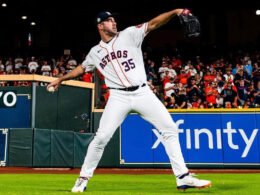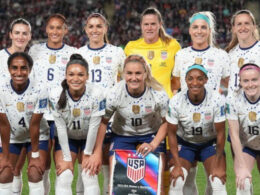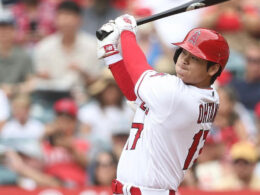By Rhonda
When seven-time WNBA All Star and two-time Olympic gold medalist Brittney Griner was detained by Russian officials after discovering cannabis vape cartridges in her luggage, it brought a secret truth out into the open, she’s not alone. It is generally perceived that most athletes use cannabis to stay on top of their game mentally and physically. Cannabis delivers many anti-inflammatory properties, as well as shifts our mind’s emotional relationship to pain, unlike other pain medication, which just wipes out the pain all together. Cannabis, weed, THC, marijuana – whatever you want to call it – it offers athletes so much more.
A look at the BG 42 logo that will go on the courts of all 12 WNBA teams to honor Brittney Griner 🙏
(via @PhoenixMercury)pic.twitter.com/AYUzmtmwU5
— Bleacher Report (@BleacherReport) May 6, 2022
What does it do for them? For one, THC (Tetrahydrocannabinol), as many refer to it, reduces anxiety and helps aid in sleep. Many athletes have to enter rest-and-recovery mode at a moment’s notice. It’s also a pain management tool, it reduces muscle spasticity, a condition that can really threaten the recovery process, and it’s reported to help athletes focus. It cuts out all the noise and helps them focus on the task at hand – laser focus.
For the reasons above, Cannabis and sports have a long history. The role of marijuana in professional sports is NOT a new development. Let’s start with Bill Walton in the early 70s. It is widely known that legendary UCLA coach John Wooden, known as a disciplinarian, let his star player, a ‘Dead Head,’ smoke weed in the locker room while no other player was allowed.
These days, it’s not surprising when a NBA star gets caught with a little weed. But that wasn’t always the case. In 1996, former NBA player JR Rider, who was with the Portland Trail Blazers at the time, was busted for smoking weed from a soda can. Years later, two more Portland Trail Blazers, Rasheed Wallace and Damon Stoudamire, were busted for marijuana after cops pulled them over for speeding. They fought the charges and they were eventually dropped.
Former running back and Heisman Trophy winner Ricky Williams infamously retired from football in 2004 for violating the league’s substance-abuse policy after failing a series of marijuana tests, but Williams ended up having a large impact on the way the substance was thought about around the league. He made it more acceptable for NFL athletes to use cannabis as a pain reliever and mood stabilizer.
Today on ESPN Daily: Across the sports world, the war on weed is basically over—and marijuana won. Ricky Williams (@Rickthelaureate) joins the show to discuss how much things have changed since his playing days, and @emilymkaplan explains why. Listen here: https://t.co/vWC0UAElxD pic.twitter.com/WwyhSjbqUT
— Mina Kimes (@minakimes) April 30, 2020
Williams was ahead of the game and things would be different for him if he was playing in the league now. In 2020, The NFL paid $1 million to two research teams investigating cannabis’s value as a pain-management tool and as neuroprotectant for “elite football players” who suffered concussions. The league no longer views it as a negative. “The fact that the NFL is on the positive side of the cannabis conversation is huge. We’re moving in the right direction,” Williams said.
Through the years leading up to the legalization of marijuana in many states, athletes have faced controversy. In 2009, one year after the Beijing Summer Olympics, gold medalist Michael Phelps was caught smoking a bong on camera. The same thing happened to former NBA player Stephon Marbury – caught on camera. Phelps lost two major sponsors afterwards. Marbury was open about it, stating, “Yep … you saw me. I’m not under contract…I smoke weed occasionally. I’m not driving … I’m following the rules.”
Today, athletes are much less secretive about their use of marijuana. UFC fighter Nate Diaz proved that in 2016 when he openly used a CBD vape pen during a post press conference. He stated “It’s CBD. It helps with the healing process and inflammation and stuff like that,” he told reporters. “So you wanna get these for before and after the fight. It’ll make your life a better place.”
Nate Diaz talking about his CBD pen after the #ufc fight. #cbd #cannabis #hemp #marijuana pic.twitter.com/STNRDHFi2S
— Why Workshop (@TheWhyWorkshop) August 21, 2016
Similar comments came from former NBA player Stephen Jackson in 2017 when he admitted to smoking weed before games. “I just gotta be real, you know it’s been a couple of games where I smoked before games and had great games,” Jackson told Michael Rapaport on his podcast.
So where do we go from here? With public support for marijuana legalization nearing unanimity, and more athletes using marijuana to treat pain, leagues continue to reduce restrictions and punishments. The current state of the four major U.S. sports leagues is as follows:
- The NFL announced in 2020 that it would not be testing for THC during the off season. The threshold for a positive test was also raised, and suspensions were replaced by fines
- In 2019, MLB removed marijuana from its list of banned substances and now treat it the same as alcohol, but players are still subject to penalty for use.
- Marijuana remains prohibited in the NBA, but the relaxed testing protocol brings the league more in line with its Big Four counterparts.
- While the NHL tests for cannabis, there’s no punishment for positives. If a player has “abnormally high levels” of THC, it’s treated as a health matter (like alcoholism would be).
One thing is for sure – the cruel consequences many athletes have faced, like American sprinter Sha’Carri Richardson who was denied the right to run in the Olympics for testing positive for marijuana, are driven by politics and stigma. A stigma that weed is a lazy stoner drug. Apparently, for athletes, this is far from the truth and it can give them laser focus and help them with rest and recovery.
It’s time to get real about marijuana. Regardless of its acceptance, pro athletes are still using THC – and will continue – as an alternative to pain medication. Further, a growing number of former athletes have joined the cannabis industry and the fight to legitimize cannabis use in professional sports. Actually, you can thank athletes for the changing tune of cannabis legalization. They have helped destigmatize it and give it a human face.
Photo Credit: Ricky Williams on Instagram





